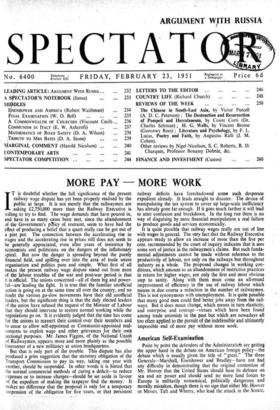MORE PAY MORE WORK
IT is doubtful whether the full significance of the present railway wage dispute has yet been properly realised by the public at large. It is not merely that the railwaymen are asking £2,750,000 more than the Railway Executive is willing to try to find. The wage demands that have poured in, and have in so many cases been met, since the abandonment of the Government's policy of restraint, seem to have had the effect of producing a belief that a quart really can be got out of a pint pot. The connection between the accelerating rise in wages and the accelerating rise in prices still does not seem to be generally appreciated, even after years of insistence by economists and politicians on the dangers of the inflationary spiral. But now the danger is spreading beyond the purely financial field, and spilling over into the area of trade union organisation and politics pure and simple. What first of all makes the present railway wage dispute stand out from most of the labour troubles of the war and post-war period is that it is official. The unions concerned—all of them big and power- ful—are leading the fight. It is true that the familiar unofficial action is going on at the same time all over the country, and no doubt the various go-slow movements have their oia unofficial leaders, but the significant thing is that the duly elected leaders of the union have refused the request of the Minister of Labour that they should intervene to restore normal working while the negotiations go on. It is evidently judged that the time has come for the unions to reassert thcir control over their members and to cease to allow self-appointed or Communist-appointed mal- contents to exploit wage and other grievances for their own section ,a1 purposes. Mr. James Figgins, of the National Union of Railwaymen, appears more and more plainly as the possible forerunner of a new militancy at union headquarters.
But that is only part of the trouble. This dispute has also produced a grim suggestion that the statutory obligation of the Transport Commission to pay its way, taking one year with another, should be suspended. In other words it is hinted that the normal commercial methods of curing a deficit—to reduce expenses or to increase charges—should be set aside in favour of the expedient of making the taxpayer find the money. It makes no difference that the proposal is only for a temporary suspension of the obligation for five years. or that persistent railway deficits have foreshadowed some such desperate expedient already. It leads straight to disaster. The device of manipulating the tax system to cover up large-scale inefficiency has already gone far enough. If it goes much farther it will lead to utter confusion and breakdown. In the long run there is no way of disguising by mere financial manipulation a real failure to produce goods and services economically. It is quite possible that railway wages really are out of line with wages in general. The very fact that the Railway Executive appears ready to allow an increase of more than the five per cent. recommended by the court of inquiry indicates that it sees some sort of justice in the railwaymen's claims. But such funda- mental adjustments cannot be made without reference to the productivity of labour, not only on the railways but throughout industry as a whole. The proposed changes in working con- ditions, which amount to an abandonment of restrictive practices in return for higher wages. are only the first and most obvious step to sanity. Along with them must come an all-round improvement of efficiency in the use of railway labour which means in due course a reduction in the number of railwaymen. This is not synonymous with unemployment. It is quite possible that many good men could find better jobs away from the rail- ways. But it does mean change, which means in turn elasticity, and enterprise and courage—virtues which have been found among trade unionists in the past but which are nowadays all too often applied to the pursuit of the indefensible and ultimately impossible end of more pay without more work.






































